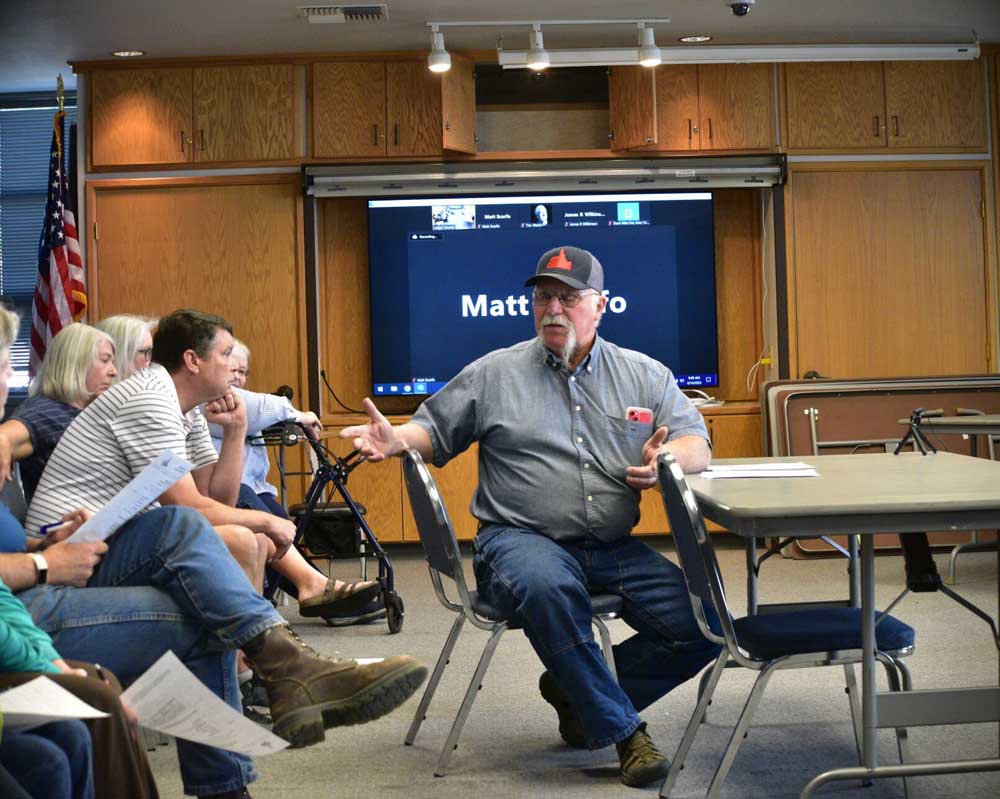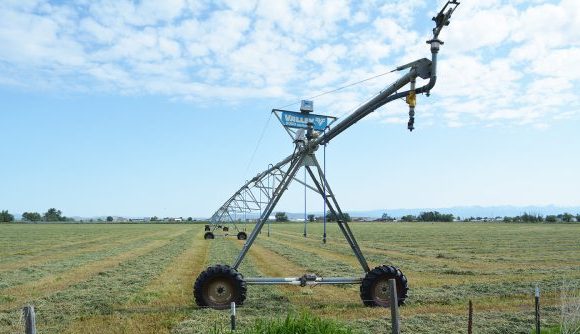Opinions expressed on Greater Idaho issue at Union County Board of Commissioners meeting
Published 2:00 pm Friday, June 16, 2023

- Grant Darrow, of Cove, talks to those attending a Union County Board of Commissioners meeting held to discuss Greater Idaho on Wednesday, June 14, 2023, in the Chaplin Building in La Grande.
LA GRANDE — Joining Idaho might mean that many people who are now Eastern Oregonians would have to make sacrifices.
That point was emphasized during a Wednesday, June 14, meeting conducted by the Union County Board of Commissioner to take input from the community on the possibility of moving Idaho’s border west into portions of Eastern Oregon.
Katherine Hays, of Elgin, who has devoted much of her life to helping low-income individuals and families, said that it is much easier for many low-income individuals to get food and services from the state in Oregon than it is for those in Idaho. This became apparent to her while she worked in Ontario.
“Crossing the border into Oregon can make such a difference for some people,” she said.
Hays said unless one has housing, a low-income Idaho resident has a very difficult time accessing services from the state. It is much easier for the unhoused in Oregon to receive state assistance, Hays said.
Hays was one of at least 30 people who attended the meeting. About a dozen spoke at the session, one of three the Union County Board of Commissioners is required to conduct each year to discuss Greater Idaho for the purpose of complying with Ballot Measure 31-101, which voters approved in 2020. To date, eight such meetings have been held by the commissioners and the June 14 session was by far the best attended.
The Union County meeting might be a foreshadowing of an event coming up in August in Wallowa County, where voters have narrowly approved a ballot measure requiring commissioners to hold similar discussions twice each year.
Greater Idaho opponents who spoke included Margaret Mead, of La Grande. She said that becoming part of Idaho may not be the panacea that people think it is.
“People think that the grass is greener on the other side of the fence until they go to the other side and find that it is artificial turf,” she said.
Ken Parsons, of La Grande, is among those who believe that by joining Idaho people would find not artificial turf but a state government more sensitive to the needs of people like farmers. Parsons said a new law in Oregon that requires agricultural employees working over 40 hours a week to receive overtime pay will have a very detrimental impact.
“It is doubling what farmers have to pay,” he said.
Parsons was referring to House Bill 4002, for which a five-year phase-in process is starting this year. Oregon is now one of a limited number of states that have removed exemptions to exclude agricultural workers from overtime laws.
Parsons said the new law will make it harder for Oregon farmers to compete on the global market. He explained they will receive little sympathy from international customers.
“If I call someone overseas and tell them I have to raise prices because of higher labor costs, they would laugh me off,” he said.
He added that 85% of legislators live within 50 miles of Salem, the state capital, and have little interest in addressing the needs of Eastern Oregonians.
“We don’t have a prayer,” he said.
Maxine Hines, of La Grande, noted that some Greater Idaho advocates claim that counties that have passed ballot measures to require discussion of the issue are support the idea of joining Idaho. Hines said that this is an incorrect interpretation.
“It doesn’t mean they want to join (Idaho,” she said. “It means they just want to talk about it.”
Max Koltuv, of La Grande, said he believes Northeastern Oregon’s schools could be hurt if Greater Idaho were to become a reality. He explained that teachers are paid much less in Idaho than in Oregon. Koltuv fears the region could thus lose a significant number of its teachers if Greater Idaho were created.
Others at the meeting pointed out that teachers are not the only ones who could take a pay cut if portions of Eastern Oregon joined Idaho. They noted that Idaho’s minimum wage is $7.25 an hour and Oregon’s ranges from $13.20 to $15.50 an hour depending on location.
A number of people at the meeting said they felt Northeastern Oregon is missing out on help from the government because it is overlooked by legislators in Salem.
Vivian Young, of La Grande, did not agree. Young, who has been attending commissioner meetings regularly for 13 months, said she has been impressed with the support Union County receives from the state and federal government for projects like improvements at the Union County/La Grande Airport.
Curt Howell, of La Grande, said the reason Eastern Oregon residents feel underrepresented in Salem is that the state does not have a system like the federal government does. Through it, all states get equal representation in the U.S. Senate regardless of their population because each has two senators. A similar system in Oregon, Howell suggested, could serve the state well.
“If each of our counties had a senator we might not have this problem,” he said.









